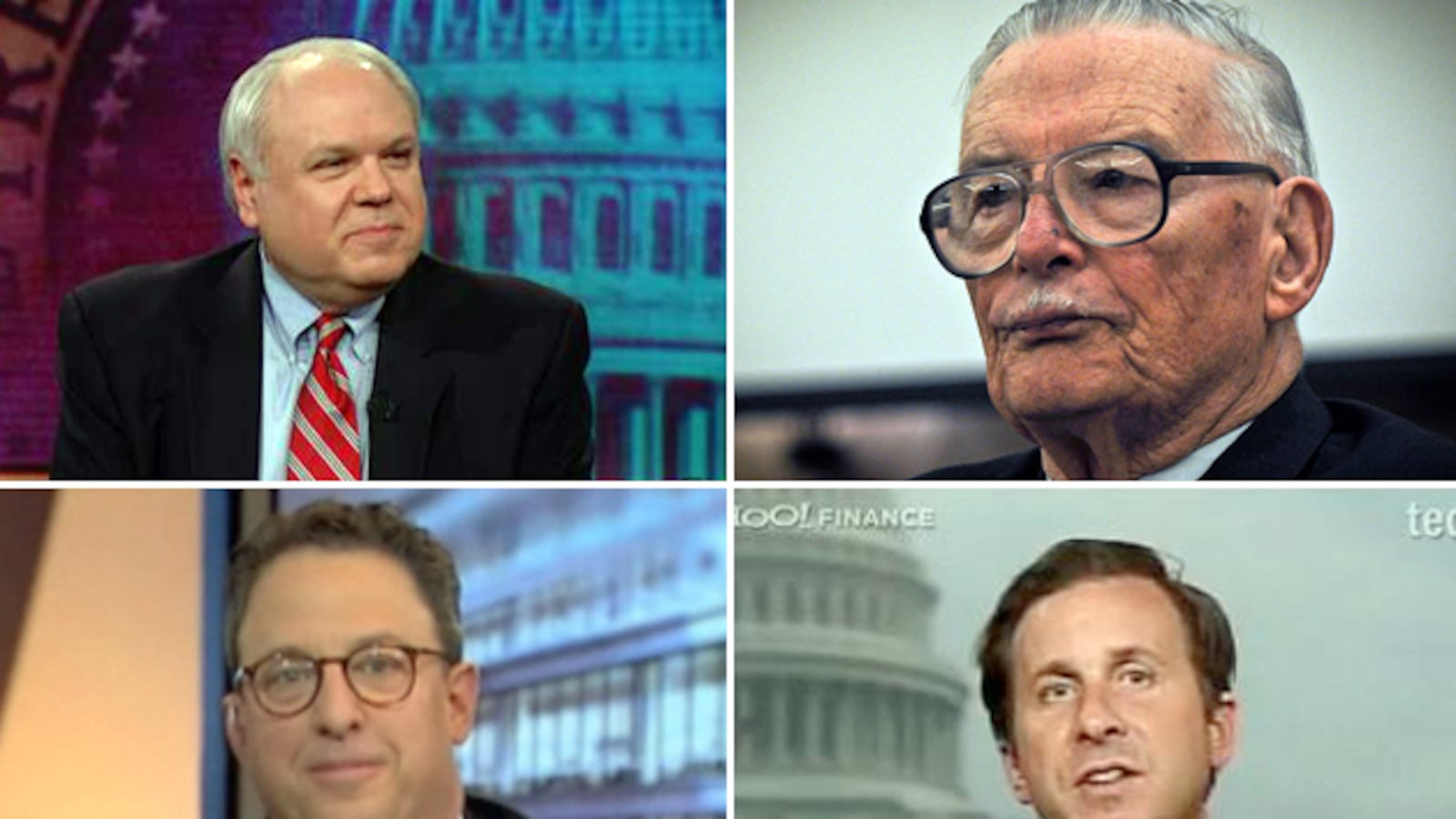I’ve been mystified in recent weeks whenever I’ve encountered a Republican member of Congress being interviewed and saying that experts think a default wouldn’t be that catastrophic. What sort of “experts,” I wonder, could these people possibly be referring to? We all know there are conservative “experts” in this world who have proved themselves willing to say that Social Security has hurt old people, civil rights have been bad for blacks, trees cause pollution, the planet is in fact cooling—and, of course, “deficits don’t matter,” at least when it’s Republicans running them up. But “default doesn’t matter” is a new breed of crackpotism. Surely no serious person says such things. Well, friend, think again—and understand the intellectual (so to speak) roots of the madness at our door.
Last Thursday, economist Bruce Bartlett gave testimony to the Democratic Steering and Policy Committee of the House. The testimony received some attention for the sections in which Bartlett, an erstwhile conservative but defiant anti-crackpot, asserted that the president could invoke Section 4 of the 14th Amendment in order to raise the limit unilaterally. This was the very day that the administration, with its usual negotiating expertise, announced that this constitutional option was dead, just as the idea was gaining currency and might have led the Republicans to believe that the president and his team might go that radical route.
But the more interesting section of Bartlett’s testimony had to do with the history on the far right of economists and others saying and writing that default would be no big deal—even that it would serve as a healthful, cleansing tonic for a befouled financial and governmental system.
There is James M. Buchanan, a conservative economist respected enough that he won a Nobel Prize for his work on public-choice theory, an economic analysis of the roles played by self-interest and social environment in politicians’ decision making. He won the prize in 1986. Perhaps feeling at that point that he’d made his bones and had nothing to lose, the next year he cranked out an essay arguing, in Bartlett’s words, that “the national debt is so fundamentally immoral that default could not be considered to be morally unjustified.”

Then there’s Murray Rothbard, a von Mises acolyte whose intense libertarianism led him toward the posture that taxation is theft. Indeed, his contribution to this literature was to discover that since public debt is repaid at the end of the day by taxes, i.e., by stolen money, making such payments stinks of immorality. Bartlett then cites conservative financial analyst Christopher Whalen, who told The Washington Post in 1992 of default, “If it’s good enough for Mexico and Brazil, why not us?” Now, there’s a slogan one doesn’t hear often enough from conservatives: Let’s be the new Mexico!
In our current times, there is a quote from the Cato Institute’s John Tamny, who wrote in Forbes that for Americans to be concerned about a default is “like the parent of a heroin addict fearing that his dealers will cease feeding his addiction.” And finally, yes, there is a proper evangelical angle on all this too, just in case you thought that base wasn’t covered. Gary North, an “economist” who bases much of his work on his reading of the Pentateuch, especially Deuteronomy, leads the charge here. You can read his four-volume study Inheritance and Dominion: An Economic Commentary on Deuteronomy, which comes in at a bracing 1,700 pages. Or you can digest this more manageable piece, in which he avers that the United States would be a “utopia” if only a "Great Default" came along to wipe out all that debt brought on by old people, sick people, public employees, and foreigners.
Obviously, Buchanan at least is a highly distinguished person, and the others to varying degrees have produced some measure of credible work. But these ideas are from some other planet. If you want to believe that the public debt is immoral and that taxation is theft, go right ahead and believe those things. But acting on them in a world that does not agree with you is a different matter. I can believe that driving on the left side of the road is a superior method of locomotion, but if I try it on the way in to work in the United States, I’ll be a public menace, endangering myself and my fellow citizens.
And yet here we are. Dozens of members of the United States Congress are driving on the wrong side of the road, forcing the rest of us into the ditch as they trundle on their reckless way. And the Democrats don’t know how to go to the American people and make these folks sound like the sowers of chaos they are? And the conventions of journalism require that they be given “equal weight” in analyses and discussions, and taken as seriously as the other side? We are a society in deep, deep trouble.





